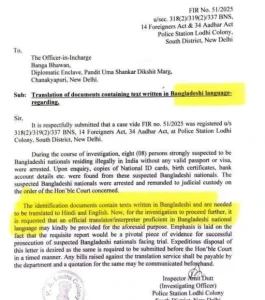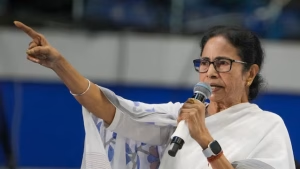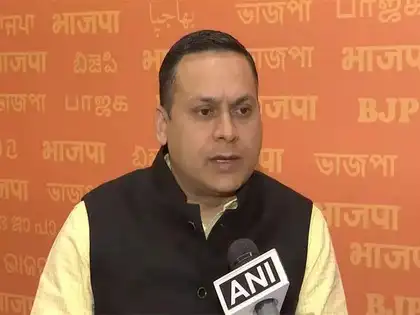New Delhi – A major political storm has erupted following a controversial letter that has intensified the Mamata Banerjee Delhi Police dispute. The West Bengal Chief Minister Mamata Banerjee has launched a scathing attack on Delhi Police after officers referred to Bengali as a “Bangladeshi language” in official correspondence, triggering widespread condemnation from political leaders, artists, and cultural figures across the nation.
The Controversial Letter That Sparked Outrage

The Mamata Banerjee Delhi Police controversy began with an August 3 letter where Delhi Police allegedly wrote to Banga Bhawan, West Bengal’s state guest house in New Delhi, seeking translation assistance for documents written in what they termed “Bangladeshi language.” This reference to Bengali has become the focal point of the Mamata Banerjee Delhi Police confrontation, with the Bengal CM describing the incident as “scandalous, insulting, anti-national, and unconstitutional.”
The letter was reportedly connected to eight individuals suspected of being illegal immigrants from Bangladesh, but the language classification has overshadowed the original purpose. The Mamata Banerjee Delhi Police dispute highlights deeper tensions between the state and central government regarding Bengali identity and constitutional recognition.
Mamata Banerjee’s Fierce Response

In her characteristic style, Mamata Banerjee launched a blistering attack on the Delhi Police through social media, making the Mamata Banerjee Delhi Police controversy a national talking point. She emphasized that Bengali is sanctified by the Indian Constitution and serves as the mother tongue of legendary figures like Rabindranath Tagore and Bankim Chandra Chattopadhyay.
The Mamata Banerjee Delhi Police clash intensified when she shared an image of the controversial letter on social media platforms, using it to rally support from Bengali-speaking communities across India. Her response has transformed what could have been a minor administrative error into a major political confrontation that threatens to strain center-state relations further.
BJP’s Counter-Attack and Political Accusations


The Mamata Banerjee Delhi Police controversy took another turn when BJP IT cell chief Amit Malviya responded with sharp criticism. He accused Mamata Banerjee of spreading misinformation for “vote-bank politics” and dismissed her social media post as “a badly scripted political stunt.”
This response has only intensified the Mamata Banerjee Delhi Police dispute, with both sides now engaging in a full-scale political battle. The BJP’s reaction suggests they view this controversy as an opportunity to counter-attack against Mamata Banerjee’s criticism while defending the Delhi Police’s actions.
TMC Leadership Demands Accountability

The Mamata Banerjee Delhi Police controversy has united the TMC leadership in demanding accountability from the central government. TMC national general secretary and MP Abhishek Banerjee has demanded an apology from Home Minister Amit Shah, under whose ministry Delhi Police operates.
Abhishek Banerjee’s statement regarding the Mamata Banerjee Delhi Police issue highlighted months of alleged targeting and harassment of Bengali-speaking people across BJP-ruled states. He described the letter as “a shocking escalation” and an attempt to “undermine Bengali identity” while equating Indian Bengalis with foreigners.
Parliamentary Response and Constitutional Arguments
TMC MP Mahua Moitra has also joined the Mamata Banerjee Delhi Police controversy, calling the language classification “a calculated action” requiring an unconditional apology from Delhi Police. Her intervention adds parliamentary weight to the dispute and emphasizes the constitutional dimensions of the controversy.
The Mamata Banerjee Delhi Police confrontation has now expanded beyond a simple administrative error to encompass broader questions about linguistic rights and cultural identity within India’s federal structure.
Cross-Party Support and CPM Condemnation
Surprisingly, the Mamata Banerjee Delhi Police controversy has received support from unexpected quarters. The Communist Party of India (Marxist), typically Mamata Banerjee’s arch-rival in West Bengal, has also condemned the Delhi Police’s language classification.
The CPM’s statement supporting the Mamata Banerjee Delhi Police position stressed that Bengali is spoken by millions in India, criticizing Delhi Police for equating “Bengali = Bangladeshi.” This cross-party support demonstrates the controversy’s potential to unite Bengali politicians across ideological divides.
Cultural Community Backlash
The Mamata Banerjee Delhi Police dispute has resonated strongly within Bengal’s artistic and cultural community. Film director Srijit Mukherji pointed out that Bengali is the same language in which India’s national anthem was originally written and represents one of the 22 official languages of India.
Singer Surojit Chatterjee’s response to the Mamata Banerjee Delhi Police controversy expressed disappointment but not surprise, suggesting that such incidents reflect broader ignorance about India’s linguistic diversity among those in positions of responsibility.
BJP’s Defense and Counter-Narrative
West Bengal BJP president Samik Bhattacharya has attempted to shift the narrative around the Mamata Banerjee Delhi Police controversy by accusing the TMC of using “fear-mongering tactics” for Indian Bengalis while allegedly “shielding” illegal immigrants.
This defense strategy in the Mamata Banerjee Delhi Police dispute attempts to refocus attention on immigration issues rather than linguistic identity, but it remains to be seen whether this approach will succeed in containing the political damage.
Constitutional and Cultural Implications
The Mamata Banerjee Delhi Police controversy raises fundamental questions about respect for India’s constitutional recognition of regional languages and the need for cultural sensitivity in official communications. As this dispute continues to unfold, it may have lasting implications for center-state relations and linguistic politics in India.

